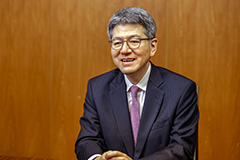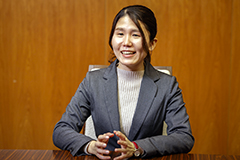Sailing With the Power of Research: A Dialogue With Executive Director Takahara Akio
2022.05.18
Upon starting the 2022 fiscal year, Omura Monami, a staff member of the Research Program Division of JICA Ogata Sadako Research Institute for Peace and Development (JICA Ogata Research Institute), interviewed Takahara Akio, the executive director of the institute (who is also a professor at The University of Tokyo). Omura asked how Takahara sees development cooperation from the field of Chinese Studies, where his expertise lies in. She also asked about his efforts as executive director and his aspirations for the new fiscal year.
Omura: Could you first provide a recap of your research area and what led you to work in that area?
Takahara: Although my main research areas are politics and diplomacy in contemporary China, I did not originally start off hoping to become an academic. As an undergraduate, I was studying political science but lost my bearings. During my third year, I traveled around the Eurasian Continent as a backpacker, in search of the bluebird of happiness. That experience drove me to build a career in international development. With an aim to become an international civil servant, I went to the UK to study for a master’s degree at the Institute of Development Studies. I had actually never enjoyed studying until then, but when I started to write academic papers by myself, studying became fun for the first time. Moreover, I was interested in China to start with as I loved the Romance of the Three Kingdoms from my childhood days, and the professor who supervised me during this master’s course just happened to be an expert of Chinese politics. Various coincidences followed one after another and led me to continue studying in the doctorate course, teach at universities and become an academic scholar, and this is where I am today.

Executive Director Takahara Akio traveled around the Eurasian Continent as a backpacker during his third year in university
Omura: As an expert of Chinese politics and diplomacy, what interests you most right now?
Takahara: The big question that I have asked myself over recent years is how China is going to look like in the coming years. This is something that can have a significant impact globally, although even the Chinese people probably cannot tell how the political system and foreign relations of their country are going to develop from here. To be a little more specific, I am interested in Japan-China relations, China’s relationship with developing countries and how Japan can be involved in their advancement.
Omura: How do you think the assistance and investments that China provides to developing countries would change from here?
Takahara: In China, the line between official development assistance (ODA) and for-profit business is not clear. For instance, while various projects are being implemented under a strategy called the Belt and Road Initiative, most of these are not ODA but rather, for-profit business investments. I think we will continue to see more investments of this kind, but perhaps at a slower rate. This is because it seems like there is less financial leeway in China than previously. Nevertheless, as the infrastructure market in China is already saturated, Chinese companies will continue to direct their attention abroad, in search of new markets.
Omura: It is the same for Japan in how demand for infrastructure has no room for domestic growth. Isn’t there a limit in repeating this approach of shifting to overseas markets when domestic market saturation happens?
Takahara: For now, there still is a huge demand for infrastructure development in developing countries around the world which supply has not caught up with. The supply-demand gap is huge because as far as I understand, although infrastructure development projects are important in building nations, they create little profit. Furthermore, in developing countries, it is highly likely for companies in infrastructure development projects to face many difficulties because of unstable socioeconomic conditions. I think these are a couple of reasons why supply growth has been slow. Yet Chinese companies took the risk and carried out many infrastructure development projects by partnering with state-owned financial institutions. When the economy was constantly growing, they may have been fine even if some of the loaned money never came back, but from now on, I think they will increasingly value economic efficiency and select projects more carefully.

Takahara talked about development cooperation from the perspective of Chinese Studies
Omura: If Japan and China are to cooperate in providing assistance and/or investments to developing countries, what kind of things would be possible?
Takahara: In Autumn 2018, Abe Shinzo, the then prime minister of Japan, visited China and 52 memoranda of understanding (MOU) were signed. Even before that, there had been talks about Japan and China collaborating in this area. When Hu Jintao, the then president of China, came to Japan in 2008 to have a meeting with Fukuda Yasuo, the then prime minister of Japan, they agreed to start discussing cooperation in the field of foreign aid. Yet when it comes to what can be done in reality, things are not that easy. China is paying a lot of attention to Japan’s experience in development cooperation and I think there is a strong interest in JICA as well. When I talk to Chinese people in the field of foreign aid, I even get asked to share more with them about what Japan has done to date. However, I have to say we are still at an exploratory stage, given how the window for cooperation can open or shut depending on the views of the governments at the time. I am hoping that private companies can draw up joint projects that can make the most of the strengths of the two countries, based on their relationships of trust built over the years.
Omura: It is rare for a bilateral aid organization to have a research institute. What do you think is the significance for JICA to have a research institute?
Takahara: As JICA Ogata Research Institute is under JICA, an organization that executes development cooperation activities, plentiful data are collected throughout the activity sites. I believe that a significant role of the institute is to conduct research work that leads to the verification and improvement of JICA’s projects based on such data. Is JICA being able to carry out projects as intended? If not, why is that the case and how can it be improved? On top of that, I hope the institute can conduct innovative research that would lead to new projects by JICA. To do this, I think JICA Ogata Research Institute has a role as the point of contact for academic collaboration with overseas institutions as well.
Omura: You always stress the importance of knowing the actual sites of our activities.
Takahara: In conducting JICA’s work, it is most important for its staff to experience the actual sites of activities for real. There is an episode I always share on this topic. When I was traveling around the world as a backpacker in 1979, I entered Afghanistan via Uzbekistan. Afghanistan was in the middle of a civil war then and right after I returned to Japan, USSR launched a full-scale military advancement into the country. Soon after, I was watching NHK’s Nichiyo Toron (Sunday Debate) and a famous scholar said that we should think that Afghanistan was already in the hands of USSR as guerillas would never be able to win there, since unlike Vietnam, there was no jungle to hide in. I wanted to shout out to tell him that was wrong because in the Afghanistan I saw for myself, the guerillas were doing better than the national military force. Even if there is no jungle, rocky mountain areas provide so many hiding places. I think it is crucial to know the actual sites. I am really disappointed in how we are unable to visit them because of the COVID-19 pandemic, including myself, but I hope all of our researchers will soon get to frequently visit project sites and gain a real sense of them. Of course, I don’t want anyone going to dangerous areas though.
Omura: What are you working on as executive director?
Takahara: Tasks as executive director include encouraging our researchers to conduct their studies and thinking of ways that allow members of our institute to conduct research activities more comfortably and efficiently. I am the lead of the cheering squad. My motto is “Learn well, think hard, talk a lot, and enjoy what you do.”
In addition to research work itself, efforts to promote research outcomes also have great importance. How are we going to have JICA Ogata Research Institute known better across society in Japan and internationally and make further contributions to the world? The only way to achieve this is to select good research topics, vigorously conduct studies and actively disseminate the outcomes. Commitment from administrative staff who support research activities is also significantly important. I think my role is to take the lead in thinking how to carry out even better research activities and disseminate the findings.
Omura: Which activities are you going to focus on toward the new fiscal year?
Takahara: I would like to continue to disseminate our achievements and facilitate communication both internally and externally by utilizing online tools. It is fine to work quietly and diligently but perhaps we can think about making a little more noise and showing our presence to express ourselves. I believe we should continue working on the task of boldly reaching out to the general public to let JICA Ogata Research Institute be better known. Furthermore, as area studies are of extreme importance to JICA, I would like to make sure we further commit ourselves in this area.

Omura Monami, a staff member of JICA Ogata Research Institute
Omura: Could you reemphasize what wonders and significance are in area studies?
Takahara: Aren’t we surprised by many things when we visit countries or communities that are totally different from ours? If you are to jump into a completely different community, be accepted by the locals and make accomplishments implementing development cooperation projects, you would likely be unsuccessful if you stick to your ways. Unless you thoroughly understand not only the local culture and customs but also the history, politics, economy and how society works there, you would not be able to effectively design and implement projects. I therefore believe that area studies are absolutely necessary for us.
Omura: Which projects are you watching closely in particular?
Takahara: To name a few, first, a new research cluster called “Politics and Governance” was established last year. This year, the institute will launch full-scale studies in the field of international political economy that examine the dynamics of the relationship between China and smaller states in the Indo-Pacific region and identify the factors that have contributed to the evolution of this relationship. Furthermore, I think the research project on the so-called “universal values” that is currently under preparation will also become a project worth noting. Of course, projects in other research clusters of the institute are all certainly important as well.
The production of the new JICA Ogata Research Institute report “Konnichi no Ningen no Anzen Hosho (Human Security Today),” which was published in March 2022, has been a breakthrough project for the development of our institute. If you see JICA Ogata Research Institute as a sailing ship, the mast would be human security, and our research activities in various fields will serve as the unfurled sails to move the ship forward.
Omura: Thank you very much.
JICA Chair Special Lecture ‘Japan after World War II and Japan-China Relations in the Modern Era’

事業事前評価表(地球規模課題対応国際科学技術協力(SATREPS)).国際協力機構 地球環境部 . 防災第一チーム. 1.案件名.国 名: フィリピン共和国.

事業事前評価表(地球規模課題対応国際科学技術協力(SATREPS)).国際協力機構 地球環境部 . 防災第一チーム. 1.案件名.国 名: フィリピン共和国.

事業事前評価表(地球規模課題対応国際科学技術協力(SATREPS)).国際協力機構 地球環境部 . 防災第一チーム. 1.案件名.国 名: フィリピン共和国.

事業事前評価表(地球規模課題対応国際科学技術協力(SATREPS)).国際協力機構 地球環境部 . 防災第一チーム. 1.案件名.国 名: フィリピン共和国.

事業事前評価表(地球規模課題対応国際科学技術協力(SATREPS)).国際協力機構 地球環境部 . 防災第一チーム. 1.案件名.国 名: フィリピン共和国.
scroll